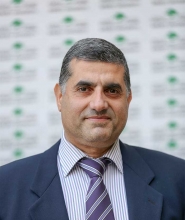Omar Zimmo

Omar Zimmo
Key Qualifications: Assistant professor at Birzeit University teaching water treatment, wastewater technology, infrastructural planning and project management in both undergraduate and graduate programs. Practical experience in water and wastewater with a professional career spanning three decades. My duties include designing and co-ordination of research and development projects in the field of water and wastewater management. I’m specialized in urban and rural areas water supply and wastewater treatment technologies and has recently been involved in several projects aiming to introduce wastewater treatment plants and has provided technical services in the field of water supply and sanitation. Chairman of the technician training – wastewater working group (WG2) within the four Palestinian water and wastewater working groups founded by the Palestinian Water Authority to manage training in Palestine. Widespread experience in the planning of infrastructural projects.
Consultant and project manager for the feasibility study for the sewerage system to serve the Rawabi community. Developer of evaluation reports for operation units at the wastewater treatment plant in Al-Bireh, West Bank. Author of feasibility study for the treatment and disposal of the wastewater for the municipal area of Ramallah and technical reviewer for project documents. Team leader for several environmental studies conducted for wastewater treatment plants and several industries in Palestine. Given lectures and presentations at numerous national and international symposiums, courses, seminars, workshops and conferences.
Zimmo O. R., van der Steen, and Gijzen H. (2003). Comparison of ammonia volatilization rates in algae and duckweek based waste stabilization ponds treating domestic wastewater. Water Research, 37 (19), 4587-4594.
Zimmo O. R., van der Steen N. P. and Gijzen H. J. (2004). Quantification of nitrification and denitrification rates in algae and duckweed based wastewater treatment systems, Journal of Environmental Technology, 25: 273-282.
Zimmo O. R., van der Steen N. P. and Gijzen H. J. Effect of dissolved oxygen and pH on nitrogen removal in batch incubations simulating algae and duckweed-based waste stabilization ponds. Submitted to Water Research
Zimmo O. R., Al Sa'ed R. and Gijzen H. J. (2000). Comparison between algae-based and duckweed-based wastewater treatment: differences in environmental conditions and nitrogen transformations. Water Science and Technology. 42: 215-222.
Zimmo O. R., van der Steen N. P. and Gijzen H. J. (2002). General process performance assessment of pilot-scale algae and duckweed-based waste stabilization ponds. Water Science and Technology 45(1):91-101.
Zimmo O. R., van der Steen N. P. and Gijzen H. J. (2003). Factors affecting duckweed growth and nitrogen removal via duckweed in duckweed-based waste stabilization ponds. AQUA Conference in Colombia. It has been accepted for publication in the Water Science and Technology.
Zimmo O. R., van der Steen N. P. and Gijzen H. J. (2004). Nitrogen mass balance across pilot-scale algae and duckweed-based wastewater stabilization ponds. Water Research. 38: 913-920.
Zimmo O. R., van der Steen N. P. and Gijzen H. J. (2005). Effect of organic surface load on process performance of pilot-scale algae and duckweed-based waste stabilization ponds. Journal of Environmental Engineering ASCE 131(4): 587-594.
Zimmo O. R., van der Steen N. P. and Gijzen H. J. Hydraulic flow patterns in algae and duckweed-based continuous flow pilot-scale waste stabilization ponds. Submitted to Water Research
Zimmo, O. R. (2003). Nitrogen Transformation and Removal Mechanisms in Algal and Duckweed Waste Stabilization Ponds. April 2003, ISBN 90 5809 576 2, 144 pp.
Zimmo, O. R., Al-Sa’ed R.M., van der Steen, N. P., and Gijzen, H. J. (2002). Processperformance assessment of algae-based and duckweed-based wastewater treatment systems. Water Science and Technology. 45(1): 91-101.
Al-Sa’ed R.M., and Zimmo, O. R. (2003). Process performance evaluation of the contact stabilization system at Birzeit University campus. Accepted in: Intl. J. Env. Pollution. 21(5): 511-517
Mahmoud N. Zimmo O.R, Zeeman G. Lettinga G. and Gijzen H. (2004). Perspectives for Integrated Sewage Management in Palestine/ the Middle East. Water 21, April 2004.
Zimmo O. R. “Wastewater Engineering in Question and Answer (2008)”. Adaptation to the situation in Palestine and Regional Countries. 11th edition, German Association for Water, Wastewater and Waste (DWA), Germany
Zimmo O. R. “Wastewater Engineering in Question and Answer (2009)”. Translation and Adaptation to the situation in Palestine and Regional Countries. 11th edition, German Association for Water, Wastewater and Waste (DWA), Germany
Zimmo O. R. and Najwan Imseih (2009). “Overview of Wastewater Management Practices in Mediterranean Countries” INNOVA-MED Conference, Innovative processes and practices for wastewater treatment and reuse in the Mediterranean region., Girona, Spain.
Zimmo O. R. (2009). “Experiences with Water Projects in Palestine and the
Middle East". InWEnt Workshop "Cooperation with the German Water Industry". Berlin, Germany”.
Luigi Pettaa, Roberto Farina, Omar Zimmo, Bassim Abbassi, Ismail Al Baz (2009). The Emwater Project: its outputs and first results from Pilot Plants operation. IWA conference, Mexico
Rashed Al-Sa`ed, Maher Abu-Madi, and Omar Zimmo (2016).Feasibility of local fixed film materials to reclaim the effluent of waste stabilization ponds for irrigated agriculture
Wala’a Alshiekh Abdallah, Omar Zimmo, Eldon R. Rene and Peter van der Steen (2017). Anaerobic biodegradation of olive mill wastewater: batch and UASB reactor performance. Int. J. Global Environmental Issues, Vol. 16, Nos. 1/2/3, 2017
Books
Zimmo, O., Al-Sa’ed, R., Mahmoud, N., Mimi, Z., Abu Madi, M., 2005. Prospects of efficient wastewater management and water reuse in Palestine. Chapter in a book, pp. 159-230: Efficient management of wastewater, its treatment and reuse in four Mediterranean countries: Jordan, Palestinian territories, Lebanon and Turkey. 2005, EMWater project funded by the European Union under the MEDA water program initiative, Germany.

